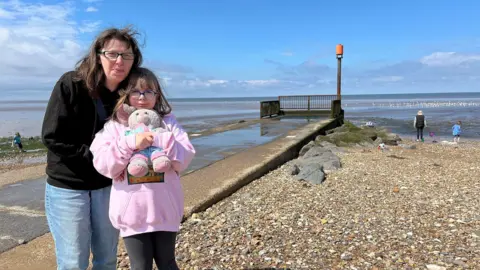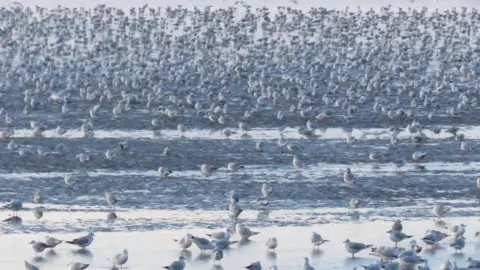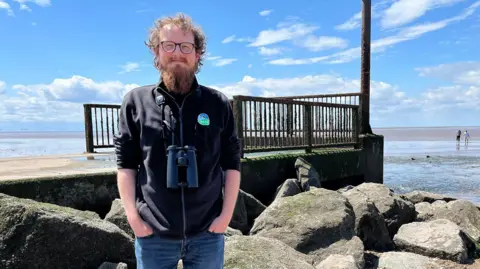Bird mess a factor as beach earns a 'brown flag'
 BBC
BBCA beach has been handed a "brown flag" award because of its poor water quality.
Heacham, near Hunstanton, is the only beach in Norfolk to receive the unofficial award, because of levels of bacteria such as e-coli from sewage and other waste.
Sewage outflows have been identified as contributors to the pollution levels - as well as the waste produced by flocks of sea birds.
The Environment Agency said it was working with Anglian Water and West Norfolk Council to make improvements.
The brown flag is awarded by a holiday park comparison site which analyses data on beach water quality from the Environment Agency.
Thirteen beaches around the coast of England have been designated the unfortunate award this year.
 Christina Brown
Christina BrownBeachgoer Colette and her daughter Amaya visit Heacham beach every day but know the water is not safe to swim in.
"We check the signs and it always says poor quality don't swim," she said.
"Some days there's foam on the water which is a brown colour. It's really not very pleasant."
Colette thinks it is more likely that an outflow pipe transporting water from nearby rivers is to blame for the poor water quality.
Ed Tooth, the RSPB conservation officer for the Wash and the north Norfolk coast, said it was not a surprise that bird mess was a contributing factor, as two million birds pass through the area every year.
"Bird DNA has been picked up as part of the routine Environment Agency testing," he said.
"It is fairly normal to expect that. We have millions of birds visiting here and we are very lucky for that.
"It's probably not just the birds that are causing the issue, but we are really keen to work with partners in order to find a solution".
He said improvements should not involve any disruption to visiting or nesting birds at Heacham.

Anglian Water said tests confirmed that seabird waste left on the mudflats near to Heacham beach was the "primary source" of bacteria found in samples of water.
"There are lots of factors that can impact bathing water quality, including agriculture, tides, and ecological factors such as algal blooms," the water company said.
It said it was investing £31.3m to investigate and improve bathing waters in the East region until 2027.
West Norfolk Council said there had been "marginal" improvements in water quality at Heacham in the past two years.
The authority said: "It's apparent that wildlife and ecology plays a significant part in impacting bathing quality results."
The Environment Agency told the BBC: "Pollution comes in many forms and from multiple sources, and the Environment Agency will continue to investigate poor water quality."
Follow Norfolk news on BBC Sounds, Facebook, Instagram and X.
